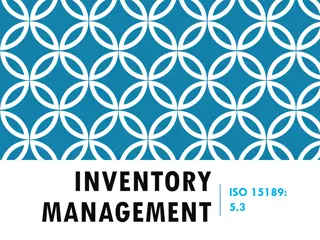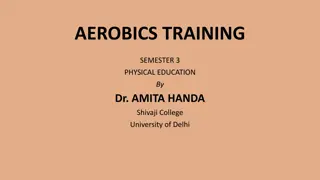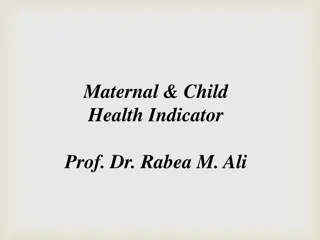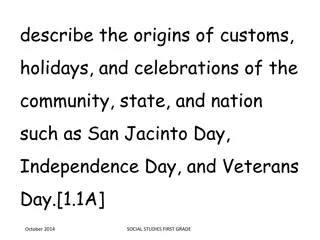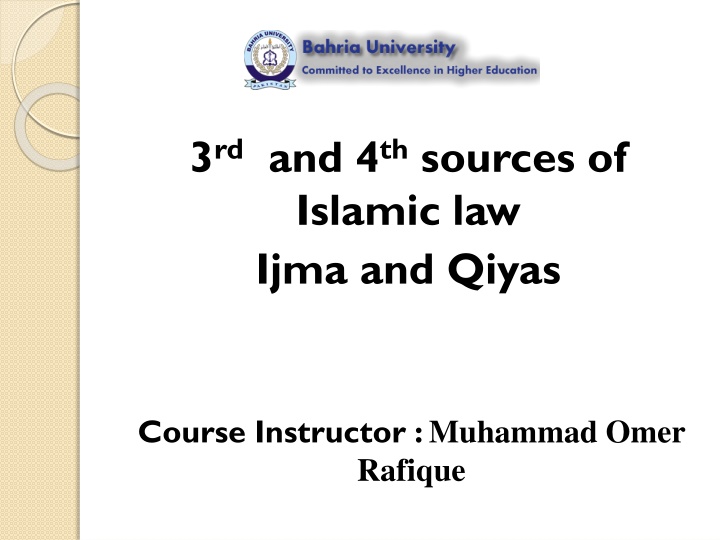
Sources of Islamic Law: Ijma and Qiyas Explained
Learn about the 3rd and 4th sources of Islamic law, Ijma (Consensus) and Qiyas (Analogical Reasoning). Understand the definitions, types, conditions, and qualifications associated with Ijma. Explore the significance of unanimous opinion, the participation of mujtahids, and the historical context for the validity of Ijma in Islamic jurisprudence.
Download Presentation

Please find below an Image/Link to download the presentation.
The content on the website is provided AS IS for your information and personal use only. It may not be sold, licensed, or shared on other websites without obtaining consent from the author. If you encounter any issues during the download, it is possible that the publisher has removed the file from their server.
You are allowed to download the files provided on this website for personal or commercial use, subject to the condition that they are used lawfully. All files are the property of their respective owners.
The content on the website is provided AS IS for your information and personal use only. It may not be sold, licensed, or shared on other websites without obtaining consent from the author.
E N D
Presentation Transcript
3rdand 4thsources of Islamic law Ijma and Qiyas Course Instructor : Muhammad Omer Rafique
IJMA(CONSENSUS) The third Source of Islamic law. Defination: (I) Meaning of Ijma Ijma is the verbal noun of the Arabic word Ajmaa it is used in two senses. (i) Determination and resolution (ii) Agreement upon a matter (II) Definition of Ijma Ijma is defined as agreement of the jurists among the followers of Mohammadan in a particular age on a question of law. THREE WAYS 1. First, Quoly- means, jurist express his opinion by tongue . 2. Second, Faily- means, when there is unanimity in practice. 3. Third, Sukuty(silence) -means, when the jurist is not agree with the opinion.
Cont: TYPES & KINDS OF IJMA 1) Ijma-i-Azimah Ijma-i-Azimah means, if all the Jurists give their consent to a particular point, it is called Ijma-i-Azimah 2) Ijma-i-Rukhsah Ijma-i-Rukhsa means, if the majority of Jurists agreed and gave their consent to particular point is called Ijma-i-Rukhsa
Conditions for the validity of Ijma Following are the conditions for the validity of Ijma. (I) Ijma by mujtahids The Ijma must be performed by Mujtahids i. e those who have attained the status of Ijtihad. (II) Unanimous opinion There must be unanimous opinion among all mujthahids upon a Hukm shari. (III) Performed by Muslims All the jurists participating in Ijma must be from the Ummah of Hazrat Muhammad (Peace be Upon Him).
Qualifications of Mujtahids Following are the qualifications of Mujtahids; Knowledge of Quran Knowledge of Sunnah Knowledge of Ijma Knowledge of Qiyas Knowledge of Maqasid-al-Shariah Knowledge of Islamic Jurisprudence He must be trustworthy He must be an adult He should be a Muslim He should be able to interpret Quran and Sunnah He must have knowledge of Arabic language He should be able to differentiate between false and authentic Hadith He should be wise and pious person Knows the principal of Naskh Conversant with the science of usul and faro
(IV) After the death of Holy Prophet (Peace be Upon Him) The Ijma must have taken place after the death of Holy Prophet (Peace be Upon Him). (V) In a determinate period The Ijma must be performed by jurists of single determined period i. e. of the same generation. (VI) Upon rule of law The Ijma must be upon rule of law and all-non legal matters are excluded from the domain of Ijma. (VII) Reliance upon sanad (Evidence) For deriving their opinion, Mujtahids should relied upon some sanad (evidence).
LEGAL STATUS Ijma is based on the verses of Holy Quran and traditions of Holy Prophet(S.A.W).Quran say s Do not like those who separated and divided after they had received the clear proofs . Again Quran say s Obey The Prophet(S.A.W) and obey those who have authority among you . Holy Prophet(S.A.W) has said It is compulsory upon you to follow the most numerous body .Again He said Whoever separates himself from the main body will go to hell .Again He Said He who oppose the Jurists decision will die the death of the days of ignorance . Again He said If anything comes to you for decision, decide according to the order of Quran and Sunnah then look to what Jurists unanimously agreed upon .
EXAMPLES 1.The 20 rakat of Tarawwih salah that is prayed in Ramadan from the 1st of Ramadan until the last day of Ramadan every day, and which is prayed after Isha Salah and in which the whole Quran is recited. This was the Ijma of the Sahaba(ra) during the time of Umar(ra), this is carried right from the time of Umar(ra) until today in both Makkah and Medina the tarawihh is prayed 20 rakat as part of Ijma of sahaba and also as the Sunnah of Umar(ra).
2.Another example of Ijma is the second Azan of Jumah(Friday), which was the Ijma of sahaba(ra) during the time of Usman(ra) which is followed through out the world also in makkah and madina as part of Sunnah of Usman(ra) The Sunnah of Sahaba(ra) is the Sunnah of the Prophet(sas) because of the Saheeh Hadeeth of the Prophet(sas) Rasulullah (Sallallaahu layhi Wasallam) said: "Hold fast to My Sunnah and the Sunnah of the Khulafaa-e-Rasheedeen" (the Rightly Guided Caliphs). In this hadith two Sunnats are mentioned, one of Rasulullah (Sallallaahu layhi Wasallam) and the other of the Sahabah (R.A)
IMPORTANCE OF IJMA 1) Difference of opinion regarding the place and position of IJMA, some Scholars say s that IJMA is confined for particular people but the majority of Scholars and Jurists say s that IJMA should not be confined to any age or generation or country 2) IJMA came into being after the death of The Holy Prophet(S.A.W).
Cont: 3 ) After the demise of HolyProphet(S.A.W) , when any dispute arose on any question, for which there were no directions in The Quran or in The Hadith, the companions of the Prophet or The Jurists of that age were deciding those question in accordance with the laws of the Holy Quran and Hadith.
Conclusion Hence for final analysis we can say that, Ijma is important for solving problems of changing society. It is the valid secondary source of Islamic law and it is an agreement among Mujtahids who belongs to the Ummah of Muhammad (Peace Be Upon Him), after his death in a determined period upon a question of law.
QIYAS: Fourth source of Islamic law Definition of Qiyas Literally; Qiyas means measuring or ascertaining the length, weight or quality of something.Scales are called miqyas. Example; the cloth was measured by the yardstick. Qiyas also means comparison equality or similarity between two things. Example: Zaid compares with Khalid in intelligence and descent. Technically; Qiyas is an extension of a Shari'ah value from an original case (asl) to a new case, because the latter has the same effective cause (illah) as the former. The original case is ruled by the Quran or Sunnah and qiyas aims to extend the same ruling to the new case based on the same illah.
The Pillars of Qiyas The original case (asl), on which a ruling is given in the text and analogy seeks to extend it to a new case. The new case (far ), on which a ruling is needed. The effective cause ( illah), which is an attribute (wasf) of the original case and it is found to be in common between the original and the new case. The rule (hukm), governing the original case which is to be extended to the new case.
Conditions of the Asl In Arabic, asl has two meanings: (i) Source such as Qur an and Sunnah. (ii) Subject matter of a ruling. Muslim jurists unanimously agreed that the sources of qiyas are Quran and Sunnah. Majority of jurists : qiyas may also be founded on a rule that is established by ijma . E.g. ijma validates guardianship over the property of minors, a rule which has been extended by analogy to authorize the guardianship of minors in marriage. Majority : One qiyas may not constitute the asl of another qiyas.
Conditions of the Far The new case must not be covered by the text or ijma . The effective cause of analogy must be applicable to the new case in the same way as to the original case. The application of qiyas to a new case must not result in altering the law of the text, which is equivalent to overruling the text by means of qiyas.
Conditions of the Effective Cause 5 most important conditions are: 1. The illah must be zahir (evident) and not khafi (hidden). 2. The illah must be mundabit (a constant attribute) which is applicable to all cases without being affected by differences of persons, times, place and circumstances. 3. lt must be a proper attribute (Al-wasf al-munasib) or bear a proper and reasonable relationship to the ruling. 4. Illah must be transient (muta addi) that is an objective quality which is transferable to other cases. 5. Illah must not be an attribute which runs counter or seeks to alter the textual authorities or the ruling of the text.
Conditions of the Hukm It must be a practical Shari ah ruling qiyas does not operate in the area of belief. The hukm must be operative, which means that It has not been abrogated. The hukm must be rational in the sense that human intellect is capable of understanding the cause of its enactments. The hukm must not be limited to exceptional situation.
Examples: 1. Prohibition of wine drinking based on Quranic verse in Surah Al- Maidah:90 Asl wine drinking Far taking drug Illah intoxicating effect Hukm prohibition 2. The Quran forbids selling or buying of goods after the last call for Friday prayers until the end of the prayer as stated in Surah al- Jumuah 62:9. By analogy, this prohibition is extended to all kinds of transactions and activities such as agricultures, administrations and others. 3. The Prophet SAW said in a Hadith that, The killer shall not inherit (from the victim) . By analogy, this ruling is extended to bequests (wasiyyah), which would implicate that the killer cannot benefit from the will of his victim.
Importance of qiyas: 1) Qiyas is an analogical deduction from the three sources of law, namely Quran, Sunnah and Ijma. 2)When Holy prophet(SAW) sent Hazrat Muaz bin Jabal as Governor, He asked him as to what he would do if a new problem arose, he said that he would follow the Quran, if it is not clear in holy Quran, he would follow the sunnah, if it is not clear in sunnah, than he would use the qiyas. (Analogy) , Holy prophet (SAW) appriciated his reply and encouraged him. 3) In another Hadith Holy prophet (SAW) has told Hazrat abu Musa-al-Ashari : judge upon the book of Allah, if you do not find in Holy Quran what you need, judge upon the sunnah of the Prophet, if you donot find in the sunnah, than use your personal opinion(Qiyas)
.A woman came to the Prophet SAW and said that her father had died without performing the hajj. Will it benefit him if she perform the hajj on the father s behalf? The Prophet told her: Supposing your father had a debt to pay and you pay it on his behalf, would this benefit him? To this her reply was affirmative and the Prophet said, The debt owed to Allah merits even greater consideration . 5. The Companions of the Prophet SAW also utilized qiyas in deducing the rulings of Fiqh For example; Abu Bakr drew an analogy between the father and the grandfather in respect to their entitlement in inheritance. 6. When the Companions held a council to determine the punishment of wine drinking, Ali bin Abi Talib suggested that the penalty of false accusation should be applied to the wine drinker, and he reasoned, by way of analogy, When a person gets drunk, he raves and when he raves, he accuses falsely .
Conclusion: Majority of Muslim jurists recognised qiyas as one of the source of Islamic law, next to the Quran, Sunnah and Ijma . In applying qiyas, four basic elements must be fulfilled, that are, the asl (original case), far (new case), illah (cause effective) and hukm (new ruling). These classic elements must always be preserved and uphold and should not be the subject for reform. The application of qiyas is still relevant and feasible in this modern and globalisation era. This is due to the increased number of new Shari'ah related issues around the world. Thus, in deducing these new hukm, there is still a need to rely on qiyas besides the other three primary sources of Islamic law.


